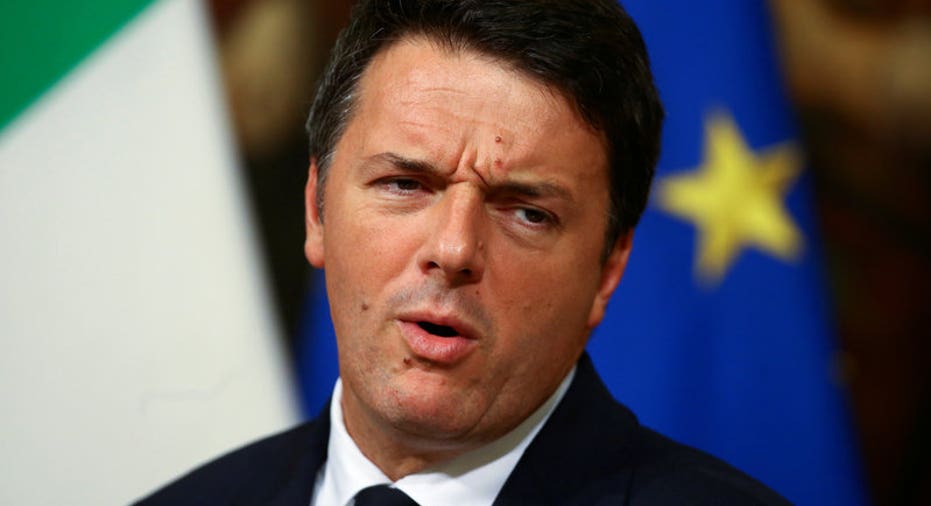Markets swing violently against Italy without clear idea of outcome

LONDON – Speculators convinced the euro zone faces fresh instability have zeroed in on Italy's constitutional reform referendum on Sunday, amassing huge bets on a slump in Italian banks and bonds should Prime Minister Matteo Renzi lose the vote.
Blindsided by skewed bookmakers' odds and equivocal opinion polls, financial markets ended up on the wrong side of Britain's vote to leave the European Union in June and Donald Trump's surprise U.S. election win last month.
Perhaps chastened by their miscalculation of public disaffection in those two pivotal 2016 events, bets against Italian assets appear to show markets now assuming voter rebellions in Italy and everywhere else in Europe.
"There are colossal short positions on Italy from the U.S. and other countries where big investors are based," Raffaele Jerusalmi, the CEO of the Italian stock exchange said this week.
Shorting, or selling a borrowed asset, is a technique traditionally used by hedge funds to bet that the value of an asset will decrease.
Data from the Italian market regulator shows "significant short positions" in Banco Popolare Di Milano and Banca Carige, while the regulator has restricted short-selling in shares of floundering Monte dei Paschi since July. http://reut.rs/2ffiDjP
Weighed down by banking shares, Italy's main index is the worst performing stock market in the developed world this year, having shed more than 20 percent. http://reut.rs/2ffdUin
Steve Eisman, who made his name and fortune by betting against subprime mortgage securities, as portrayed in the film 'The Big Short', outlined to Reuters his extremely negative views on��Italian bank equities.��
"Nobody is going to invest in the Italian banks unless they trust their balance sheets," said Eisman, adding that Italian lenders have been "very slow" to recapitalize and sell off troubled assets.
"In the Italian system, the banks say (assets) are worth 45-50 cents in the dollar. But the bid price is 20 cents. If they were to mark them down, they would be insolvent."
There is also evidence that investors have taken short positions in Italian government debt on a scale not seen since the euro zone debt crisis of 2011/2012. http://reut.rs/2fLW0lO
A sharp fall in the price of futures contracts , agreements to sell bonds at a specified price at a later date, and a corresponding rise in outstanding contracts called 'open interest' is a tell-tale sign of shorting, say analysts.
The jumping cost of hedging against swings in the euro's value next week also suggests investors are bracing for widespread fallout from Sunday's vote.
NOT CLEAR CUT
But for many money managers, the outcome is far from clear.
For a start, markets are once again chiming with opinion polls that suggest Italians will reject Renzi's reforms, aimed at bringing political stability to a country that has had 28 governments in 50 years. Doomsday scenarios assuming a snap election if he resigns following a 'No' vote may also prove wide of the mark.
Berenberg's chief economist Holger Schmieding sketched out three alternative scenarios to "unlikely" elections: President Sergio Mattarella could re-appoint Renzi, mandate another center-leftist to form a new government, or even try to persuade Silvio Berlusconi's center-right party to join or support a caretaker or technocratic government.
Meanwhile, the European Central Bank has pledged to stem any market fallout by upping its purchases of Italy's debt.
"There's no certainty of what a 'No' vote really means," said Patrick O'Donnell, an investment manager at Aberdeen Asset Management in London.
Analysts polled by Reuters this week foresaw only a modest hit to markets whatever the result of Sunday's vote.
HEDGING BETS
And there have been signs this week that some investors are hedging their bets. Analysts said firm demand at an Italian debt auction showed that some investors were scrambling to cover their short positions in futures markets.
BlackRock, the world's largest asset manager, is among funds staking contrarian bets. One of its top bond managers said he has been scaling up exposure to European banks and financial stocks beaten up by worries over Italy's referendum.
For others, the referendum in Italy may just be a medium through which to game an even more extreme scenario -- the break-up of the euro zone. That risk is increasing with a rise in euroskepticism that threatens more shock election results in France, the Netherlands and Germany next year.
Speculators such as Eclectica's Hugh Hendry have placed money on the widening gulf between bond yields of Italy and Germany -- the two biggest and most liquid debt markets -- to express the view that the 19-country bloc might fracture. That spread is near its widest levels for 2-1/2-years, showing how popular that trade has become.
An investor survey from Frankfurt-based Sentix this week saw a 19.3 percent chance of Italy leaving the bloc in 2017, the highest in four years.
The chance of any country leaving the euro zone stood at 24.1 percent, well below a peak of over 70 percent seen in 2012.
(Additional reporting by Giulio Piovaccari in Milan; Vikram Subhedar, Dhara Ranasinghe and Patrick Graham in London; Balazs Koranyi in Frankfurt; and Jennifer Ablan and Trevor Hunnicutt in New York; Editing by Mike Dolan and Catherine Evans)



















